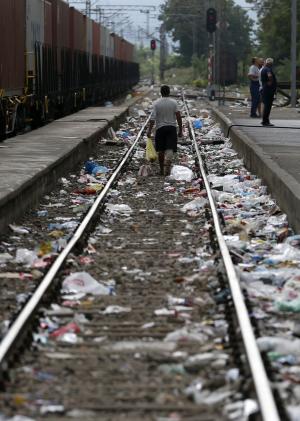Date: Fri, 21 Aug 2015 15:54:45 +0200
By DUSAN STOJANOVIC and IVANA BZGANOVIC
GEVGELIJA, Macedonia (AP) — With her 10-day-old baby in her arms, Amina Asmani fought her way past baton-wielding Macedonian riot police and boarded a train that took her a step closer to her dream destination: Germany.
The Syrian migrant from the embattled town of Kobani felt lucky that she, her son and husband managed to get on the train in the southern Macedonian town of Gevgelija, where officers beat back others. The next day, Macedonia blocked thousands of migrants from crossing the border from Greece, leaving them stranded in a dusty no-mans' land.
Things became even more tense on Friday, when Macedonian special police forces fired stun grenades to disperse people in a crowd of 3,000 migrants who had spent the night out in the open and tried to charge them several times. At least eight people were injured.
The reason for the blockade was, in part, the chaotic scenes at the Gevgelija railway station, not far from the border.
Macedonia, an impoverished Balkan country that is not part of the European Union, has become a major transit route for thousands of migrants from the Middle East, Africa and Asia. Almost 39,000 have been registered passing through over the past month, double the month before. Most, over 31,000, are Syrians. Some 2,000 migrants converge on the station daily, up from 1,000 only weeks ago.
They come on boats from Turkey and then walk through Greece to Macedonia, where they catch trains heading to the border with Serbia. From there they try to slip into Hungary, a member of the 28-nation European Union. Once they're in the EU, they can cross borders more easily en route to more prosperous countries, though Hungary is building a fence at its border with Serbia to try to keep them out.
On the packed train, Asmani carefully placed her rosy-cheeked baby in a cot. She said she gave birth on a Greek island while joining the massive migrant exodus from countries wracked by war and poverty.
"We want to go to Germany to find a new life because everything has been destroyed in Syria," she said, holding her husband's hand and tenderly watching the baby, who feverishly sucked on a pacifier. "The policemen let us on the train only because they felt sorry for the baby."
At the station, tempers flared at the ticket booths and in lines for temporary refugee papers on the garbage-filled platforms. Men fought for space in the shadows to protect their families from the blazing sun. They pushed and shoved over a single water tap, or electric sockets rented out by locals to charge mobile phones.
"People are very nervous because they have been waiting here for many hours," said Najip Zazal from Afghanistan, as he took up a position for the rush toward the next train. "It's scorching sun and there are no facilities here even for children or sick people. We have been walking the whole night to get here."
Most migrants walk over the border from Greece on rusty train tracks that lead them straight to the drab station with peeling yellow paint that has not seen a renovation since Macedonia was part of communist Yugoslavia before the 1990s. The station has become one of the major trouble spots on migrant routes in Europe, like the Greek island of Kos or the French port of Calais.
When they walk into the Gevgelija station, the exhausted migrants are greeted by vendors who charge them double what the shops just around the corner charge for bottled water. They also sell fruit — one euro ($1.12) for a single banana or an apple. It's 2 euros ($2.25) to charge a mobile phone.
"They are ripping us off, but what can you do when you feel like you are going to die of thirst or hunger?" said Fadil, a Syrian who gave only his first name. "All we want is to get on this damn train and leave this nightmare behind."
But that is not easy. There are only three regular trains a day running on the 170-kilometer (100-mile) route to the border, where the migrants again have to walk to Serbia. And the trains have only two carriages that can pack a maximum of 150 people each.
This week, some 3,000 migrants were stranded at the Gevgelija station.
Last week, police arrested three Syrians as angry crowds threw stones, bottles and shoes at officers attempting to restore order at the station. Several migrants have been injured in clashes with police who have been trying to stem the rush on trains by allowing only small groups, mainly families with small children, to board.
Families are often split in the chaos.
A boy in a red T-shirt frantically paced along the platform, shouting "Mama! Mama!" when he and his small curly-haired sister found themselves alone in front of the train — their parents blocked by police meters (yards) away. A woman in a black scarf sat on the pavement, desperately crying as she told the officers that her sister and brother were on the other side of the cordon.
Obad, a 20-year-old migrant from Syria, said he and his traveling companions are not bothered by the chaos — because they have survived much worse.
"We are not afraid of anything," he said. "We escaped from dying."



